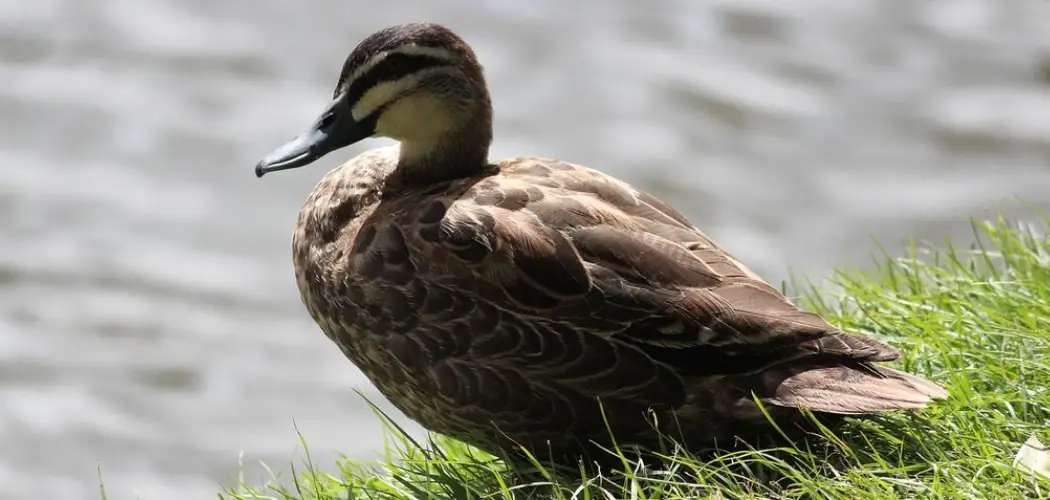Ducks, with their endearing quirkiness and valuable contributions to farm life, are beloved members of many poultry flocks. However, like any other animal, they are susceptible to parasitic infections that can compromise their health and well-being. Deworming is a crucial aspect of duck care, but traditional chemical dewormers may raise concerns about residual effects and environmental impact.
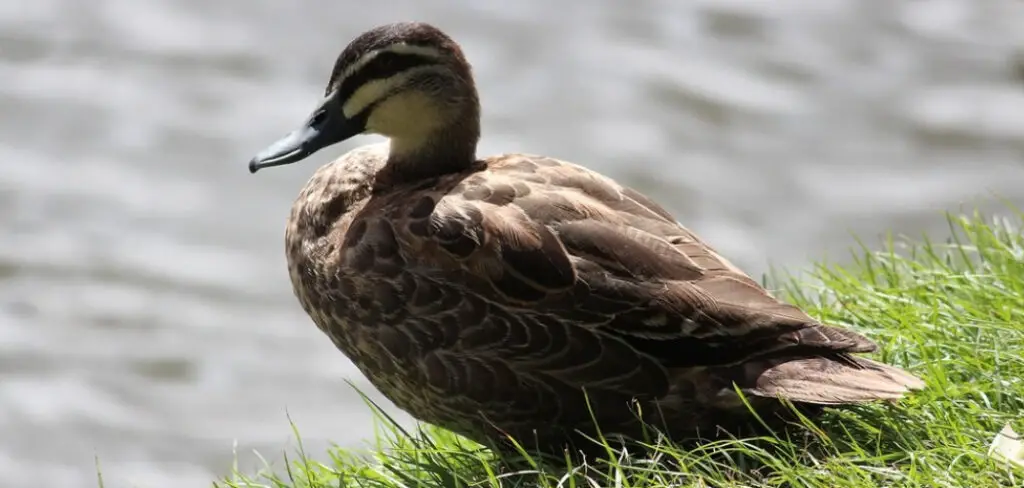
Fortunately, there are natural and holistic approaches to deworming ducks that prioritize their health and minimize the use of synthetic chemicals. From herbal remedies to dietary adjustments, these methods offer effective alternatives to conventional deworming practices. In this guide, we’ll explore various natural deworming strategies tailored specifically to ducks, empowering duck keepers to maintain the health and vitality of their flock in a sustainable and environmentally conscious manner.
Whether you’re a seasoned duck enthusiast or a novice caretaker, understanding how to deworm ducks naturally is essential for ensuring their long-term health and happiness.
Importance of Deworming Ducks
Parasitic infections in ducks can severely impact their health, leading to weight loss, decreased egg production, poor feather quality, and at worst, mortality. Intestinal parasites, such as worms, compete with the host for nutrients, which can result in malnutrition and weakened immune systems. This not only affects the individual bird’s well-being but can also reduce the overall productivity and efficiency of the flock. Regular deworming helps in mitigating these risks by ensuring that ducks maintain optimal health, thereby contributing to a more vigorous and resilient flock.
Furthermore, healthy ducks are better equipped to resist infections and diseases, reducing the need for medical interventions that could further stress the animals or the environment. Thus, the importance of deworming ducks cannot be overstated, forming a foundational aspect of responsible duck care and management.
Understanding Duck Worms
Before tackling the issue of deworming, it’s crucial to understand the types of parasitic worms that commonly affect ducks and the symptoms they may exhibit. Ducks can host a variety of intestinal worms, including roundworms, tapeworms, and flukes. These parasites can vary in size, from barely visible to several inches long, and all have the potential to cause significant health issues.
Roundworms are among the most common and can lead to malnutrition, stunted growth, and even blockages in severe cases. Tapeworms, which ducks can contract from eating infected insects and slugs, absorb nutrients from the duck’s diet, leading to weight loss and general debilitation. Flukes, though less common, can affect ducks that have access to stagnant water, where these parasites thrive.
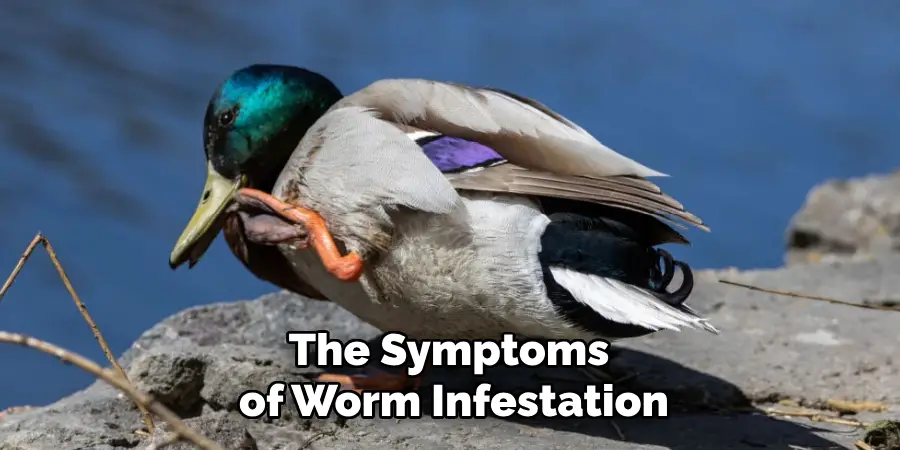
The symptoms of worm infestation can be subtle or pronounced, ranging from a decrease in egg production and weight loss to more severe symptoms such as diarrhea, lethargy, and visibly poor feather condition.
It’s important to regularly monitor the health and behavior of your ducks, as early detection of these symptoms can lead to more effective treatment and a speedy recovery. Armed with knowledge about these common parasites and the signs of infestation, duck keepers can better protect their flocks through preventative measures and timely intervention.
Common Types of Worms Affecting Ducks
Ducks can be affected by several types of parasitic worms, each causing its own set of challenges and health issues. Understanding these parasites is the first step toward effective prevention and treatment.
- Roundworms (Ascaridia Spp.): One of the most prevalent parasites in ducks, roundworms live in the intestines, where they consume the nutrients meant for the host. Infestations can lead to malnourishment, stunted growth, and in severe cases, intestinal blockage.
- Tapeworms (Cestoda): Tapeworms are segmented parasites that attach to the intestinal walls of ducks, sapping nutrients directly from the digested food of their host. Ducks typically get tapeworms by eating intermediate hosts like slugs and snails that are infected with tapeworm larvae.
- Flukes (Trematoda): Flukes are a less common but still significant concern for ducks, especially those with access to or living near stagnant water sources. These flatworms can infect ducks through water or infected hosts, leading to liver and intestinal disease.
- Gizzard Worms (Amidostomum anseris): Specifically targeting the gizzard, these worms can cause significant damage to the digestive tract, leading to poor nutrient absorption, weight loss, and in severe cases, death.
- Capillaria Worms (Capillariasis): These are tiny, hair-like worms that can infest the intestines or throat, causing weight loss, diarrhea, and in heavy infestations, significant damage to the intestinal wall.
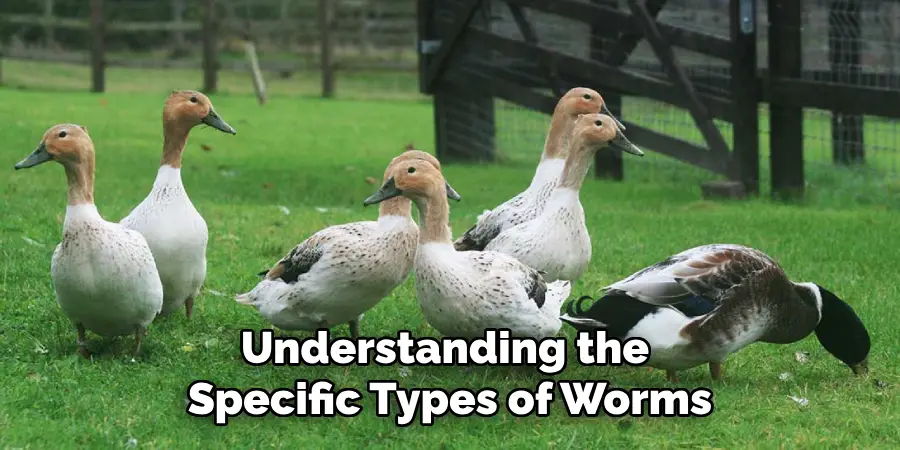
Identifying and understanding the specific types of worms that can affect ducks is critical for implementing effective deworming and management strategies to ensure the health and productivity of the flock.
Symptoms of Worm Infestation in Ducks
Identifying worm infestations early in ducks is crucial for timely intervention and treatment. Although the symptoms can vary depending on the type and severity of the infestation, some common signs can alert duck keepers to potential health issues. These include:
- Weight Loss or Poor Weight Gain: Despite a healthy appetite, infested ducks may lose weight or fail to gain weight appropriately due to parasites consuming the nutrients from their food.
- Decreased Egg Production: Laying ducks may produce fewer eggs as a result of the energy and nutrients being siphoned off by the worms.
- Diarrhea: Parasitic infections can disrupt the normal digestive process, leading to loose or watery stools.
- Lethargy or Reduced Activity: Infested ducks may appear less active or less interested in their surroundings due to the discomfort or malaise caused by the parasitic load.
- Poor Feather Condition: Nutrient loss can also affect feather quality, leading to dull, ragged, or missing feathers.
- Visible Worms in Feces: In some cases, worm segments or whole worms may be visible in the droppings of the ducks.
- Anemia: Pale combs or wattles can signify anemia, which may occur in severe infestations as worms deplete the host’s blood or nutrients.
- Swollen Abdomen: Severe worm infestations can lead to a distended abdomen, indicating internal blockage or significant nutritional deficiencies.
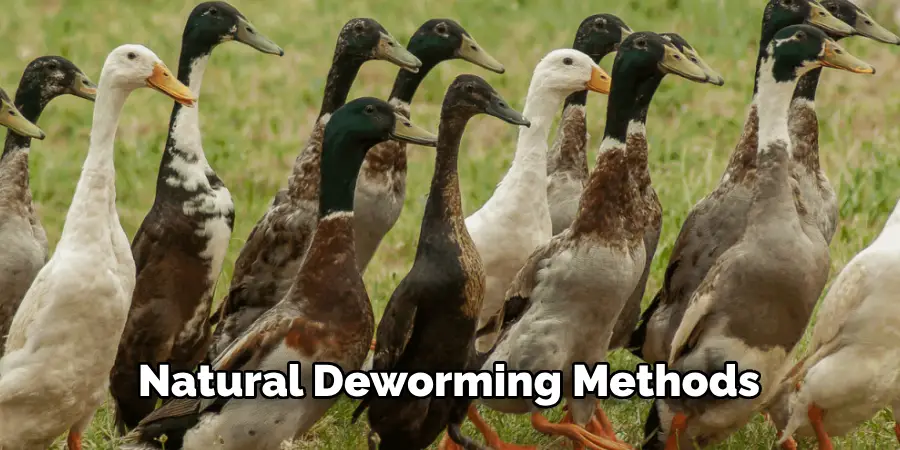
Keeping a close eye on your ducks for these symptoms can help in the early detection of worm infestations. Prompt diagnosis and treatment, particularly with the natural deworming methods discussed, can help mitigate the impact on your flock’s health and productivity.
Risks Associated with Untreated Worm Infestations
Leaving worm infestations in ducks untreated can lead to a multiplicity of risks and detrimental effects on both individual ducks and the entire flock. Prolonged infestations not only stress the affected birds, impairing their immune response, but can also lead to a series of more severe health complications, including:
- Severe Nutritional Deficiencies: Continuous absorption of nutrients by the worms can critically deprive ducks of essential vitamins and minerals, leading to weakened bones, poor feather quality, and overall decreased vitality.
- Impaired Growth and Development: Young ducks are particularly vulnerable to worm-related growth impediments. Without adequate nutrients, they may not reach their full size or weight, affecting their health and lifespan.
- Increased Susceptibility to Diseases: Weakened by the parasitic invasion and nutritional deficiencies, ducks become more susceptible to other diseases. This susceptibility is a substantial risk during colder months or when exposed to infectious agents, potentially leading to outbreaks that could affect the entire flock.
- Spread of Infestation: Worm infestations can quickly spread within a flock, especially in densely populated or poorly managed conditions. This can lead to a cycle of reinfection and escalating health issues among all the birds.
- Mortality: In severe cases, especially with heavy worm burdens or in conjunction with other health issues, untreated infestations can lead to death. This outcome is particularly tragic when it could have been prevented with prompt and effective deworming protocols.
By understanding these risks, duck keepers can appreciate the critical importance of regular health monitoring and the timely application of deworming strategies to protect their flock’s health and ensure its productivity.
10 Methods How to Deworm Ducks Naturally
1. Incorporate Pumpkin Seeds:
Pumpkin seeds are rich in cucurbitacin, a compound that has been shown to paralyze and expel intestinal worms in poultry. To utilize pumpkin seeds as a natural dewormer for ducks, start by acquiring raw, unsalted pumpkin seeds. Grind the seeds into a fine powder using a blender or food processor. Mix the pumpkin seed powder into the ducks’ feed, starting with a small amount and gradually increasing the dosage over time.
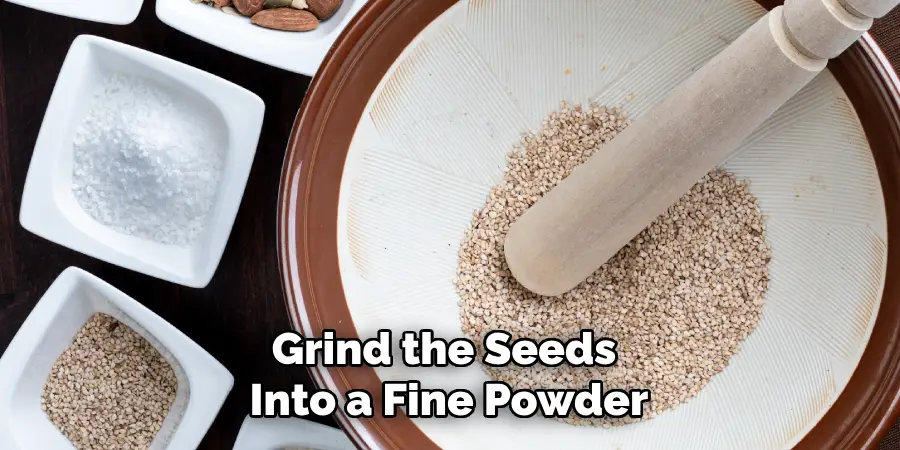
Monitor the ducks for any signs of improved health or reduction in worm infestation.
2. Add Garlic to Feed or Water:
Garlic contains sulfur compounds like allicin, which have natural anti-parasitic properties. To incorporate garlic into the ducks’ diet, crush fresh garlic cloves and mix them into their feed or water.
Start with a small amount, such as one clove per gallon of water or one clove per cup of feed, and gradually increase the dosage as tolerated. Garlic can help prevent and control internal parasites when consumed regularly by ducks.
3. Offer Apple Cider Vinegar:
Raw, unpasteurized apple cider vinegar is believed to create an acidic environment in the digestive tract, making it less hospitable for parasites.
Mix a small amount of apple cider vinegar into the ducks’ drinking water, starting with a teaspoon per gallon and gradually increasing to a tablespoon per gallon as tolerated. Regular consumption of apple cider vinegar may help reduce the risk of parasite infestation in ducks.
4. Use Wormwood:
Wormwood is a potent herb that contains compounds like absinthin and anabsinthin, which have anthelmintic properties. These compounds can help eliminate internal parasites in ducks. However, wormwood should be used with caution due to its strong potency and potential toxicity at high doses.
Offer dried wormwood leaves or powder in small amounts mixed into the ducks’ feed. Consult with a veterinarian or poultry expert for guidance on safe dosage and administration of wormwood.
5. Administer Diatomaceous Earth (DE):
Food-grade diatomaceous earth is a natural substance composed of fossilized diatoms, which are microscopic algae skeletons. DE works by physically disrupting the exoskeletons of parasites, causing them to dehydrate and die. To use DE as a dewormer for ducks, mix a small amount into their feed on a daily basis.
Start with a conservative dosage, such as one teaspoon per cup of feed, and gradually increase as tolerated. Ensure that you use food-grade DE and avoid inhalation of the dust during application.
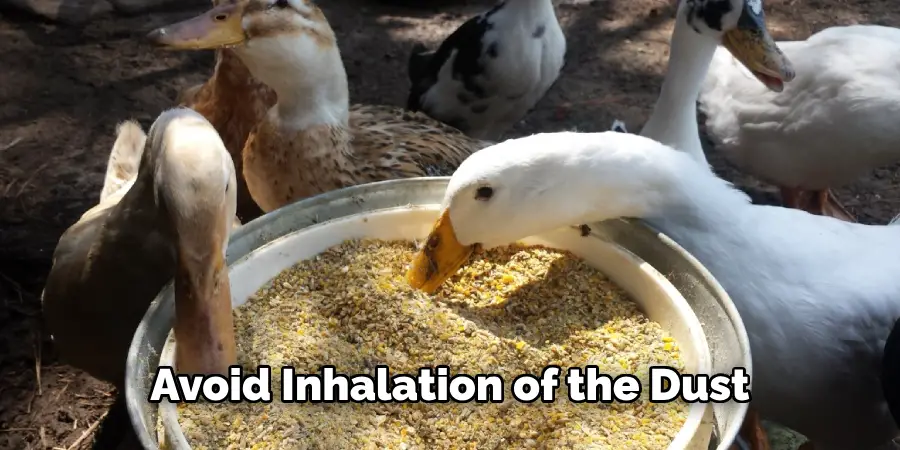
6. Provide Herbal Teas:
Herbal teas made from plants like chamomile, thyme, oregano, or wormwood can help support ducks’ digestive health and immune function, making them less susceptible to parasite infestations.
To offer herbal teas to ducks, brew the herbs in hot water and allow the tea to cool before providing it to the ducks in their drinking water. Alternatively, you can mix the dried herbs directly into their feed. Herbal teas can be offered on a regular basis as part of the ducks’ overall wellness regimen.
7. Rotate Grazing Areas:
Implementing rotational grazing for ducks can help break the parasite lifecycle and reduce the risk of parasite infestations. Rotating ducks to different grazing areas periodically allows pastures to rest and recover, minimizing the buildup of parasite eggs and larvae in the soil. Rotate ducks to fresh pasture regularly, and avoid overcrowding to prevent overgrazing and parasite transmission.
8. Ensure Clean Water Sources:
Clean, fresh water is essential for maintaining ducks’ health and well-being. Ensure that ducks have access to clean drinking water at all times, as contaminated water sources can contribute to parasite infestations. Clean waterers regularly to prevent algae growth and contamination, and provide fresh water daily to encourage adequate hydration and digestion.
9. Provide Ample Foraging Space:
Ducks that have plenty of space to forage and exercise are less likely to ingest contaminated soil or feces containing parasite eggs. Provide ducks with ample outdoor space to roam, graze, and engage in natural behaviors like pecking and scratching. Avoid overcrowding ducks in small enclosures, as this can increase stress and susceptibility to parasite infestations.
10. Consult with a Veterinarian:
Before implementing any natural deworming methods, consult with a veterinarian who has experience with poultry health.
A veterinarian can provide guidance on the most effective and safe deworming strategies for your ducks, as well as offer advice on proper dosages, administration, and monitoring for potential side effects. They can also perform fecal exams to identify specific parasites and tailor a deworming plan based on your ducks’ individual needs.
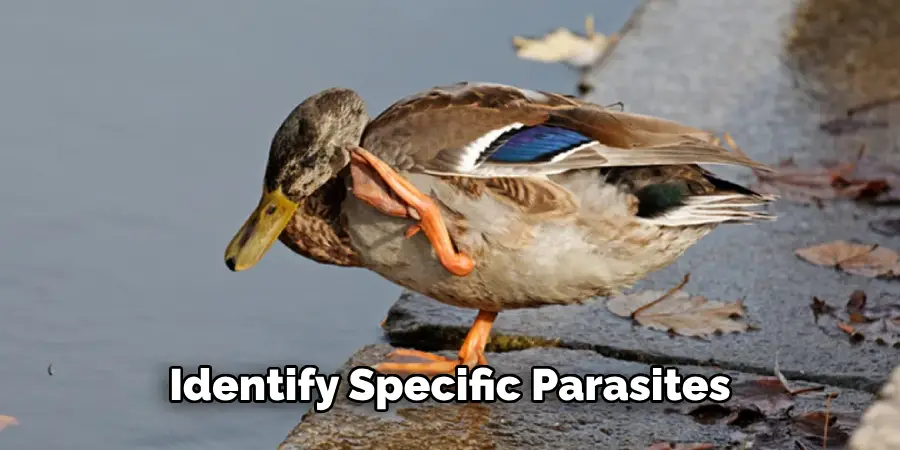
Things to Consider When Implementing Natural Deworming Strategies for Ducks
When opting for natural deworming methods for your ducks, several key considerations should be taken into account to ensure the effectiveness and safety of these approaches:
- Age and Health of the Ducks: Young ducks and those with compromised health may respond differently to natural treatments compared to healthy, adult ducks. Adjust dosages and methods accordingly, observing for any adverse reactions or signs of distress.
- Parasite Load: Determine the severity of the infestation before starting treatment. Severe cases may require more immediate, conventional veterinary intervention before natural methods can be effective.
- Local Climate and Environment: The local environment plays a crucial role in the lifecycle and prevalence of parasites. Strategies that work well in one region may be less effective in another due to differences in temperature, humidity, and the types of parasites present.
- Combination of Methods: No single method is likely to be wholly effective on its own. A combination of natural deworming strategies, carefully selected based on their synergistic potential, may offer the best protection against parasites.
- Observation and Patience: Natural methods often take longer to show results compared to chemical dewormers. Continuous observation and a degree of patience are necessary to accurately assess the effectiveness of these treatments over time.
- Compliance and Consistency: For natural deworming efforts to succeed, they must be applied consistently and as part of a routine health management plan. Irregular application diminishes their effectiveness and may lead to resistance among the parasite population.
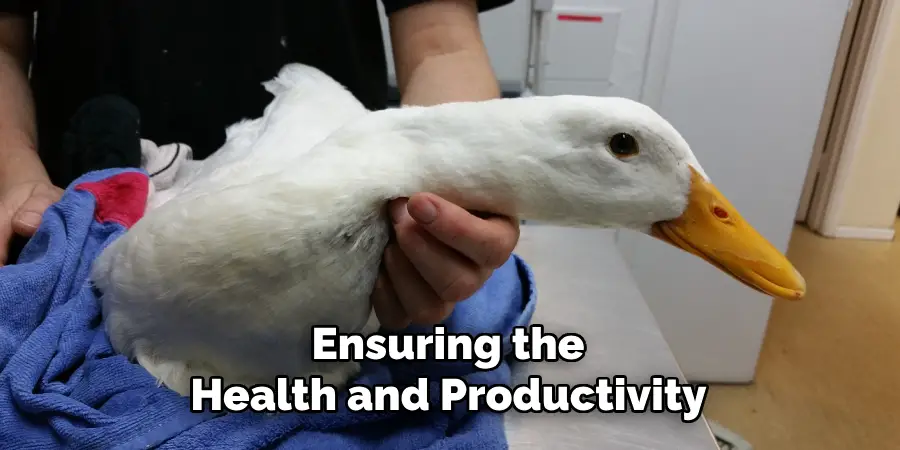
By considering these factors, duck keepers can implement a natural deworming protocol that is both safe and effective, ensuring the health and productivity of their flock while adhering to a more holistic approach to poultry management.
Conclusion
In conclusion, adopting natural deworming methods for ducks aligns with the principles of holistic and sustainable animal care. By prioritizing the use of herbal remedies, dietary supplements, and other natural interventions, duck keepers can effectively manage parasitic infections while minimizing the use of synthetic chemicals and their potential side effects.
Additionally, embracing natural deworming practices promotes environmental stewardship by reducing the introduction of harmful substances into ecosystems. As we strive to maintain the health and vitality of our duck flocks, it’s essential to recognize the value of holistic approaches that work in harmony with nature. By integrating these natural deworming strategies into our duck care routines, we not only safeguard the well-being of our feathered companions but also contribute to a healthier and more sustainable environment for all.
Let us continue to explore and implement natural solutions that support the health and happiness of our beloved ducks, fostering a deeper connection to the natural world in the process. Now that you know how to deworm ducks naturally. While it does take a few steps each time, hopefully now you understand the process and why it’s worth taking the extra step to make sure your floor is properly cared for. So don’t wait any longer, take action today!
About
Outdoor Fixes is a distinguished figure in the world of Diy design, with a decade of expertise creating innovative and sustainable Diy solutions.
His professional focus lies in merging traditional craftsmanship with modern manufacturing techniques,
fostering designs that are both practical and environmentally conscious. As the author of diy,
outdoorfixes delves into the art and science of outdoorfixes-making, inspiring artisans and industry professionals alike.
Education RMIT University
(Melbourne, Australia) Associate Degree in Design (Outdoor Fixes) Focus on sustainable design, industry-driven projects,
and practical craftsmanship. Gained hands-on experience with traditional and digital manufacturing tools, such as CAD and CNC software.
Nottingham Trent University
(United Kingdom) Bachelor’s in outdoorfixes.com and Product Design (Honors) Specialized in product design with a focus on blending creativity with production
techniques. Participated in industry projects, working with companies like John Lewis and Vitsoe to gain real-world insights.
Publications and Impact
In diy, Outdoor Fixes his insights on indoor design processes, materials, and strategies for efficient production.
His writing bridges the gap between artisan knowledge and modern industry needs, making it a must-read for both budding designers and seasoned professionals.

